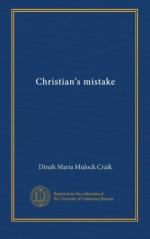“Oh, my dear, if you would only speak—only let out your feelings a little; for you must feel this day so; I’m sure I do, just as if it were my own wedding day, or Isabella’s, or Sarah Jane’s. And when they do come to be married, poor lambs! I hope it will be as good a match as you are making—only, perhaps, not a widower. But I beg your pardon. Oh, Miss Oakley, my dear, we shall miss you so!”
And the good woman, who had a heart—and hearts are worth something—clasped the orphan-bride to her broad bosom, and shed over her a torrent of honest tears.
“Thank you,” Christian said, and returned the kiss gently, but no tears came to her eyes.
“And now,” added Mrs. Ferguson, recovering herself, “I’ll go and see that every thing is right; and I’ll get my warm tartan shawl for you to travel in. It is a terrible snowy day still. You’ll come down stairs presently?”
“Yes.”
But the instant Mrs. Ferguson was gone Christian locked the door. The same look, of more than pain—actual fear—crossed her face. She stood motionless, as if trying to collect herself, and then, with her hands all shaking, took from her traveling-trunk a sealed packet. For a second she seemed irresolute, and only a second.
“It must be done—it is right. I ought to have done it before—Good-by forever.”
Good-by to what—or to whom?
All that the fire revealed, as she laid the packet on it, stirring it down into a red hollow, so that not a flickering fragment should be left unconsumed, were four letters—only four—written on dainty paper, in a man’s hand, sealed with a man’s large heraldic seal. When they were mere dust, Christian rose.
“It is over now—quite over. In the whole world there is nobody to believe in—except him. He is very good, and he loves me. I was right to marry him—yes, quite right.”
She repeated this more than once, as if compelling herself to acknowledge it, and then paused.
Christian was not exactly a religious woman—that is, she had lived among such utterly irreligious people, that whatever she thought or felt upon these subjects had to be kept entirely to herself—but she was of a religious nature. She said her prayers duly, and she had one habit—or superstition, some might sneeringly call it—that the last thing before she went on a journey she always opened her Bible; read a verse or two, and knelt down, if only to say, “God, take care of me, and bring me safe back again;” petitions that in many a wretched compelled wandering were not so uncalled for as some might suppose. Before this momentous journey she did the same; but, instead of a Bible, it happened to be the children’s Prayer-Book which she took up; it opened at the Marriage Service, which they had been inquisitively conning over; and the first words which flashed upon Christian’s eyes were those which had two hours ago passed over her deaf ears, and dull, uncomprehending heart—




